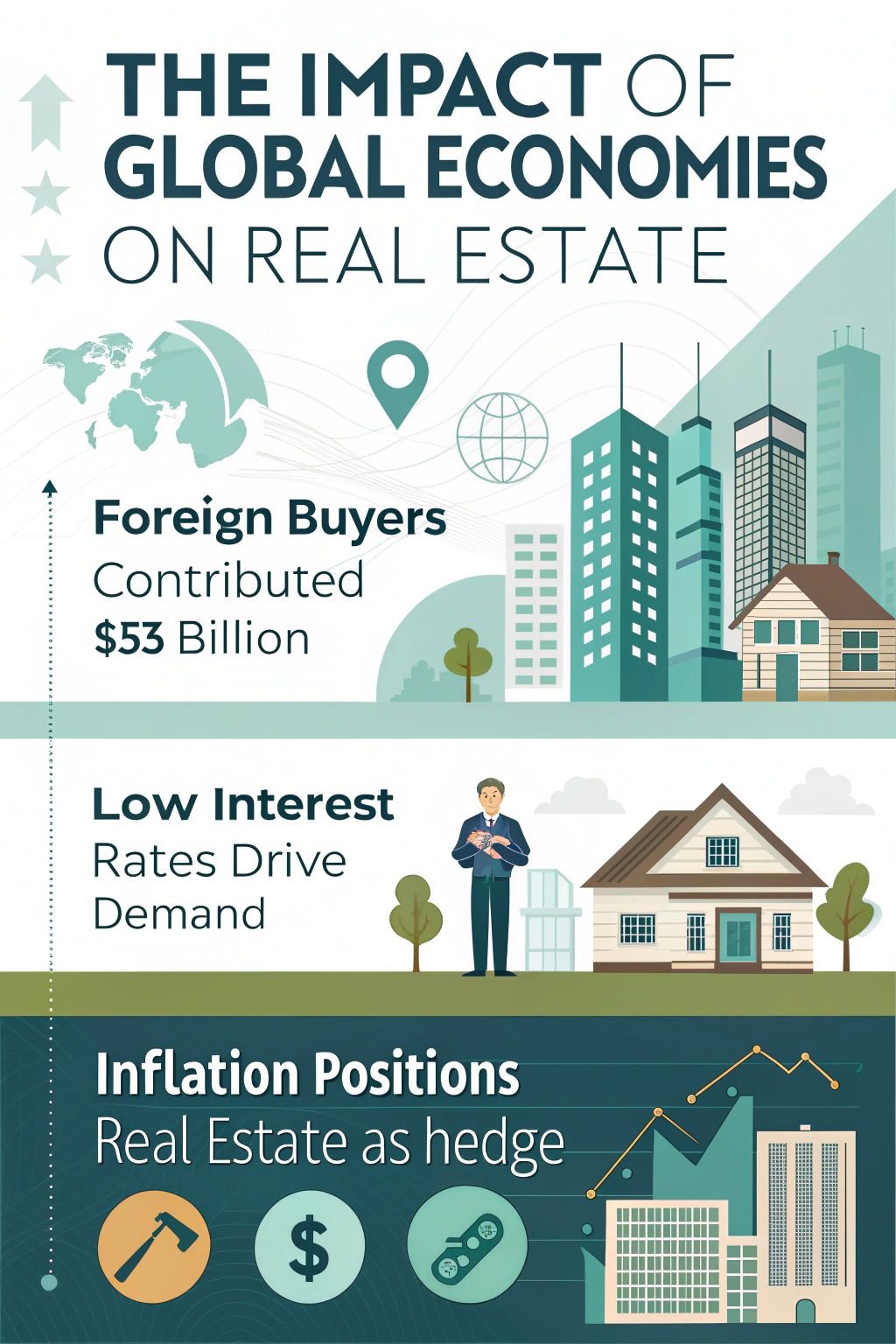The global economy influences the real estate market in ways you may not even realize. From shifting property values to rising housing prices, economic changes around the world directly impact how and where you invest.
Whether you’re a home buyer, seller, or investor, these factors can feel overwhelming when making decisions about your next move. 3
For instance, foreign investments often increase demand in major cities, while currency exchange rates can make overseas properties more or less affordable for buyers like you. Understanding these connections is essential to protecting your finances and maximizing your investment returns. 1
This blog will help you understand how global economies affect residential and commercial real estate. You’ll discover what drives these changes—and how to use them to your advantage.
Keep reading—you won’t want to miss this! 2
Key Takeaways
- Global economies impact real estate through foreign investments, interest rates, and trade policies. For example, foreign buyers added $53 billion to the U.S. market, with significant contributions from China ($13.6B) and Canada ($6.6B).
- Reduced interest rates increase property demand by lowering loan costs, while higher rates hinder housing markets due to more expensive mortgages.
- High inflation affects affordability but also positions real estate as a safeguard against rising prices if managed effectively during economic changes or recessions like 2008.
- Trade policies and currency exchange fluctuations influence cross-border investments; weaker currencies often draw more foreign buyers compared to stronger ones.
- Climate change increases insurance premiums for at-risk properties, with events like the $92.9 billion in damages from U.S. disasters in 2023 emphasizing the associated risks and costs for investors.

The Impact of Global Economies on Real Estate

Global economies influence real estate markets by affecting property values and housing demand. Changes in monetary policies or international trade can lead to adjustments that affect investments worldwide.
Influence of Foreign Investments
Foreign investors have a significant impact on the real estate market. In the U.S., foreign investment in real estate surpasses $53 billion, making up 1.8% of existing-home sales. 1 Buyers from countries like China and Canada lead these purchases, contributing $13.6 billion and $6.6 billion respectively.
Popular states such as Florida (23%), California (12%), and Texas (12%) attract most foreign investments due to their economic appeal.
These investments increase property values, especially in residential real estate markets. The median home price for properties bought by overseas buyers is 3% higher than that of overall U.S. existing home sales prices, reflecting increased demand from global capital flow. 2 As a buyer or seller, you can take advantage of this trend if your property is located in high-demand areas favored by international buyers.
“Foreign investment doesn’t just influence housing supply; it reshapes entire local economies,” says Jay Hernandez, a licensed broker with over 15 years of experience.
Effects of Global Economic Trends
Shifts in global economic trends spread through the real estate market, impacting property values and demand. 3 Lower interest rates promote real estate investments by reducing borrowing costs.
On the other hand, rising interest rates make mortgages more expensive and slow overall market activity. Central banks play a key role in setting these rates, directly influencing your ability to buy or invest in residential or commercial properties.
High inflation affects housing prices and affordability. While real estate can offer protection against inflation, extreme levels may reduce purchasing power for homebuyers like you. 3 Economic downturns or recessions diminish investment confidence and weaken markets globally. For instance, challenges like the financial crisis of 2008 caused significant declines in capital flow to developing countries while increasing unemployment.
Adjusting your strategies during such periods helps reduce risks tied to global shifts that impact housing demand across major cities worldwide.
Trade Policies and Their Repercussions on Real Estate
Trade policies impact property values by affecting global investment flows and economic growth. Free trade agreements can positively influence local real estate markets through rising demand, job creation, and increased income.
For example, infrastructure projects connected to trade enhance nearby residential and commercial real estate prospects. 4
Fluctuations in exchange rates driven by trade policies also affect cross-border investments. A stronger local currency may discourage foreign investors, while a weaker one can draw them in.
These changes directly shape housing prices in globalized hubs and developing countries alike, presenting opportunities or potential challenges for your real estate investment strategies. 5
Key Factors Driving Global Influence in Real Estate

Global forces significantly influence real estate markets. Changes in policies, technology, and nature affect where and how people invest in properties.
Interest Rates and Financial Policies Interest rates directly affect mortgage costs and housing demand. Lower rates decrease borrowing expenses, boosting buyer interest and increasing property values. 6 Higher rates have the opposite effect, making loans more expensive and slowing down housing markets.
Interest rates directly affect mortgage costs and housing demand. Lower rates decrease borrowing expenses, boosting buyer interest and increasing property values. 6 Higher rates have the opposite effect, making loans more expensive and slowing down housing markets.
For instance, during 2020’s economic slowdown, central banks lowered interest rates to record lows to encourage home buying.
Financial policies can also impact your real estate investments. Governments may provide tax credits or subsidies that increase housing demand in certain areas. 7 Policies like quantitative easing influence credit markets, shaping how easily you can secure financing for residential or commercial real estate.
Rising interest rates mean less affordable mortgages—buyers must evaluate their options carefully, says Jay Hernandez, a licensed broker with over 15 years of experience.
Technology and Innovation in Real Estate
Smart technology is changing how you buy, sell, and manage property. Digital tools now enable quicker transactions, lower costs, and enhance market research. 8 Virtual tours provide opportunities to view residential real estate from anywhere globally.
Blockchain simplifies paperwork by ensuring the security of contracts and easy tracking of transactions.
Artificial intelligence (AI) improves predictive analysis for property values and housing demand. This enables real estate investors to identify trends ahead of others. 3 Apps also simplify rental management with automated rent collection or maintenance requests.
These advancements make your real estate investment process more efficient while saving time.
Climate Change and Sustainability Considerations
Technology has boosted energy-efficient housing, but climate change continues to challenge real estate markets. Rising global temperatures and natural disasters are driving up insurance premiums.
Over the past two years, rates increased by 10.5% per quarter due to related losses. 9 These changes impact housing demand and property values in vulnerable areas.
The U.S. experienced 28 major climate disasters in 2023, costing over $92.9 billion in damages. 9 Sustainability-focused policies like the Inflation Reduction Act provide tax incentives for green building upgrades.
Investing in sustainable residential or commercial real estate could help mitigate risks while aligning with growing market trends centered on eco-friendly solutions. 10
Tips and Considerations for Investing in Overseas Real Estate
 Investing in overseas real estate can bring great opportunities, but it requires careful planning. Focus on these tips to make smart decisions and protect your investments.
Investing in overseas real estate can bring great opportunities, but it requires careful planning. Focus on these tips to make smart decisions and protect your investments.
- Research the Local Market
Study housing demand, property values, and economic growth in your target region. Understand if the area caters to residential or commercial real estate needs. Emerging markets often promise high returns but carry higher risks. - Understand Tax Structures
Each country has unique tax policies tied to real estate investing. Some may include higher capital gains taxes or hidden fees. Consult a local compliance advisor to avoid financial losses. 11 - Account for Political Risks
Evaluate political stability and changes in trade policies before buying property abroad. Sudden shifts in governments can impact property laws, taxation, and market sentiment significantly. - Monitor Interest Rates and Monetary Policies
Changes in interest rates set by central banks affect mortgage rates for international investors. Higher rates can increase costs, while predictable monetary policies offer better financial security. - Factor in Currency Exchange Rates
Exchange rate volatility directly impacts profits from overseas investments. A weaker currency might seem appealing upfront but could reduce net ROI if not well-timed. - Focus on Location First
Choose an area with strong economic cycles, business hubs, or tourist attractions for consistent demand and higher resale potential later on. 12 - Evaluate Climate Change Impact
Coastal properties affected by rising sea levels need extra insurance coverage, which increases expenses long-term. - Confirm Supply Chain Reliability
Construction delays due to disrupted supply chains raise project costs unexpectedly—especially during global events like pandemics or embargoes. - Spread Your Investments Across Markets
Avoid concentrating all assets within one country’s economy; diversifying across markets reduces risks from financial crises. - Complete Comprehensive Research Before Acquisition
Hire experienced legal teams familiar with local laws to confirm ownership titles before finalizing any deal abroad!
Challenges Posed by Globalization in Real Estate

Globalization introduces uncertainty in real estate markets, affecting housing demand and property values. Changes in global events can also result in heightened risks for investors, requiring thorough risk evaluation to safeguard returns.
Economic Volatility and Real Estate Markets
Economic volatility directly impacts housing demand and property values. Inflation raises costs, making buying or investing in real estate more challenging for many people. High inflation can reduce residential real estate activity as homes become less affordable. 3 For example, during the Great Recession of 2008, housing prices across the United States dropped significantly due to economic instability.
Changes in interest rates also have a major effect on the real estate market. Central banks set these rates based on economic conditions, influencing mortgage costs and borrowing power.
An increase in interest rates can make buying less affordable for buyers while slowing commercial real estate development by raising financing expenses. Markets connected to global hubs often experience greater shifts because foreign investments may change due to varying monetary policies or international events like trade wars or financial crises.
Political Instabilities and Their Effects
Political instability disrupts real estate markets. Uncertain governments often deter foreign investments, leading to lower housing demand and declining property values. 13 For example, nations experiencing political unrest may witness stricter regulations or increased taxes on international buyers.
These policies can reduce capital flow into both residential and commercial real estate sectors.
Local conflicts also impact the cost of living and housing prices. A government’s inability to implement stable economic policies creates risk for investors like you. 3 This unpredictability makes it harder to evaluate investment risks in emerging markets or global hubs.
In many cases, political shifts may affect tax revenues, mortgage-backed securities, or even access to central banks’ financial support systems.
Conclusion

Global economies influence real estate in ways you can’t overlook. Changes in interest rates, trade policies, and currency values impact markets significantly. Foreign investments enhance some areas while others face challenges with instability.
By keeping updated on trends and economic changes, you can make more strategic investment choices. Pay attention to local insights and global events to identify opportunities early.
FAQs
1. How do global trade policies affect real estate markets?
Trade policies can influence property values by impacting economic growth, capital flow, and housing demand. Changes in international economic relations can also create spillover effects on residential and commercial real estate.
2. What role does monetary policy play in the real estate market?
Monetary policy affects interest rates set by central banks, which directly impacts housing prices, affordability, and investment strategies for both residential and commercial properties.
3. Why are foreign investments important to the real estate sector?
Foreign investment boosts demand in global hubs and emerging markets. It influences property values while shaping trends like unaffordable housing or increased development in developing countries.
4. Can a financial crisis impact housing prices globally?
Yes, financial crises often disrupt capital markets and reduce GDP growth. This leads to lower housing demand as cost of living rises or risk assessments tighten across economies.
5. How does climate change affect real estate investments?
Climate change creates risks for property locations prone to natural disasters or rising sea levels. Investors must consider these factors during due diligence when diversifying their investments.
6. What strategies help manage risks in volatile economic environments?
Risk management involves analyzing market research, monitoring global events like shifts in Chinese steel production or immigration patterns, and adapting investment strategies based on current data from economists about GDP growth trends or capital flows into financial securities related to real estate markets.
References
- ^ https://www.getwaltz.com/blog-posts/foreign-investments-reshaping-us-real-estate (2024-03-13)
- ^ https://www.forbes.com/councils/forbesbusinesscouncil/2022/06/02/foreign-investment-in-us-real-estate-surges-amid-global-market-volatility/
- ^ https://www.lynkmesmartcards.com/post/the-impact-of-global-economic-trends-on-real-estate (2024-03-13)
- ^ https://www.linkedin.com/pulse/influence-international-trade-real-estate-markets-muhammad-asif-cxtsf
- ^ https://www.sciencedirect.com/science/article/pii/S2405844023079124
- ^ https://www.investopedia.com/articles/mortages-real-estate/11/factors-affecting-real-estate-market.asp
- ^ https://pmc.ncbi.nlm.nih.gov/articles/PMC10570591/
- ^ https://www.researchgate.net/publication/335810331_Digital_Technology_And_The_Real_Estate_Industry
- ^ https://www.bdo.com/insights/advisory/the-impact-of-climate-change-on-the-real-estate-market-an-insurance-perspective
- ^ https://www.sciencedirect.com/science/article/pii/S1544612324004112
- ^ https://rsmus.com/insights/industries/real-estate/investing-in-foreign-real-estate-here-are-6-points-to-consider.html (2022-10-19)
- ^ https://www.theregreview.org/2024/08/31/navigating-foreign-investments-in-united-states-real-estate/ (2024-08-31)
- ^ https://numberoneproperty.net/en/news/impact-of-globalization-on-real-estate-markets (2024-10-21)





















